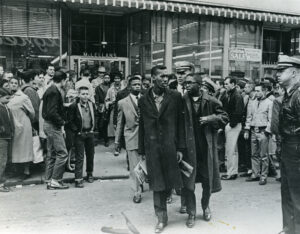Twenty-First Sunday after Pentecost
10:30 AM • ZOOM Meeting
Study Leader: Mark Bi ddle
Scripture: Matthew 22:34-46
Sermon: “Two Easy Questions”
https://us02web.zoom.us/j/834854376
If you’d rather join by phone, call: (301) 715-8592
Meeting ID: 834 854 376
In this time of social distancing, we stay connected to one another by gathering virtually in worship to join our voices together in prayer, to fellowship and share with one another, and to explore scripture in an interactive format. Contact Sheryl or the church office if you need help getting ZOOM onto your device.

Artwork: Scene from Nashville Civil Rights protests, 1960
Notes: The Nashville Sit-in Movement officially began with the first sit-in taking place on February 7th 1960. Yet, this was preceded by months of student participation in workshops, conducted by the Vanderbilt Divinity School’s own James Lawson. These workshops dealt with the discipline of nonviolence as espoused by Gandhi with specific reflection on the Christian faith and its role in bringing about peace and love. Born, then, from a profound emphasis on the teachings of the Christian tradition, the sit-ins served as a concrete response to the injustice of segregation in U.S. society.
As supporter and activist John Lewis recalls his involvement and experiences in the movement, it is evident how the impetus of the Christian faith to love one’s neighbors as one’s self was continually sacrificed in the face of racist bigotry. He states, “We went into the five-and-tens—Woolworth, Kresge’s, McClellan’s—because these stores were known all across the South…We took our seats in a very orderly, peaceful fashion. The students were dressed like they were on the way to church or going to a big social affair. … The managers ordered that the lunch counters be closed, that the restaurants be closed, and we’d just sit there all day long.”
Attribution: Scene from Nashville Civil Rights protests, from Art in the Christian Tradition, a project of the Vanderbilt Divinity Library, Nashville, TN. [retrieved October 5, 2020]. Original source: Vanderbilt University Special Collections.